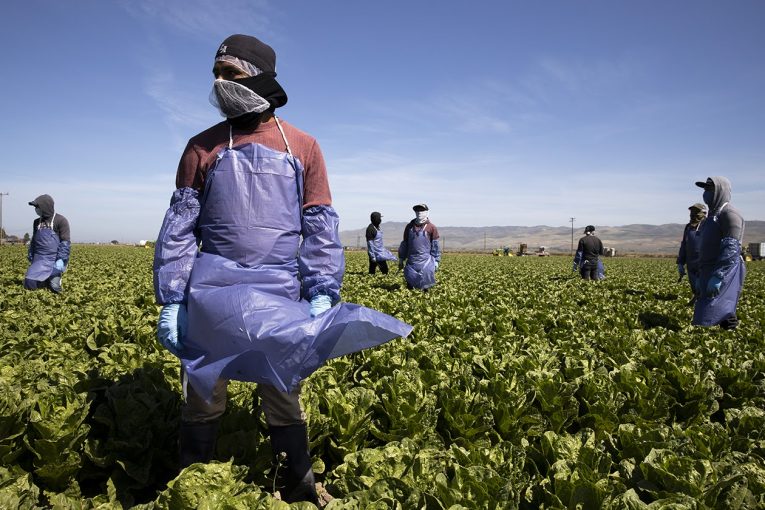

By Flor Sanchez
YOLO COUNTY– As more and more people are eligible to receive the COVID-19 vaccine in Yolo County, the question of when and how the farmworkers of Yolo County will receive theirs is important. Jenny Tan, Yolo County’s Public Information Officer, answered some questions regarding the vaccination efforts being made in Yolo County.
In response to the question of where Yolo County currently stands in regards to the vaccination efforts for farm workers and if there is a push for farmworkers to receive the vaccine, Tan said, “As of last week, we have vaccinated about 73 percent of our [agricultural] workers. We did a few more clinics over the past week that have not been input into the data yet so the 73 percent should actually be a bit higher.”
Tan mentioned that this has been an ongoing effort that has taken place for about three months, as Yolo County has prioritized these “vulnerable and essential farmworker communities.”
Tan mentioned that this has been a collaborative effort between Yolo County and the farm owners who employ the workers.
“Owners have provided their farms as vaccination sites and many have allowed workers to go during work hours (and still get paid for their time) while the county has provided translators, vaccine education, and conducts independent outreach to identify farmworkers for vaccination,” she said.
Tan emphasized that the County has worked collaboratively with many local groups, “we have done education, worked with local partners (like RISE, ApoYolo, and many others), provided multiple clinics, answered questions, and many more.”
ApoYolo is one of many local partners that has narrowed the gap between farmworkers and vaccination efforts.
ApoYolo has assisted in many ways, including helping “educate residents and families about the vaccine and also to vaccinate them at our clinics. ApoYolo has also helped identify individual farmworkers, as well as other eligible individuals in Yolo County’s Latino immigrant population,” as Tan stated.
When it comes to how farmworkers were able to fall under eligibility to receive the vaccine, Tan stated that “farmworkers fall under Tier 1B of the state’s vaccine rollout, and have been a priority group for Yolo County from the very beginning.”
This great momentum of vaccination for farmworkers comes right before the “intensive agriculture work season.”
In response to an inquiry about how Yolo County compares to other counties’ farmworker vaccination efforts, Tan said, “Yolo County is a statewide leader in vaccinating our farmworker community.”
Tan continued, “The county has done a great job to not only get farmworkers vaccinated but to make them a priority and to do it in a way that is equitable and reduces barriers.”
Through these vaccination efforts, Yolo County has demonstrated that all communities are taken into account and are noticed. “Together, it is an important way for Yolo County to show that we know our farmworkers are important and deserve the time and attention to get vaccinated,” said Tan.
In times like these, breaking down barriers between different communities in the county is important. “It’s not just about getting the vaccine into arms,” Tan explained, “it’s also about doing it in a way that creates trust, lowers barriers, and incorporates partners. We are all in this together.”
While these efforts have been successful, another question—more into the future—can be asked: What other resources should farmworkers look forward to in Yolo County?
Tan said, “Many farmworkers are eligible for a variety of federal, state, and local assistance programs – Yolo County can help farmworkers who live or work in Yolo with determining which programs they may be eligible for and how to apply for them via our bilingual help-line for farmworkers operated by the County’s Farm Workforce Coordinator.”
Through collaborative partnerships and many other resources, Yolo County has managed to accelerate vaccination efforts for a community that would have otherwise faced many barriers.
Flor Sanchez is a third-year student at UC Davis, currently double majoring in Communications and Managerial Economics. She is from Patterson, CA and enjoys traveling.





In a time of difficult news, this story needs to be celebrated. I just got off a call in which ongoing testing and support to farmworkers was the topic. This is the work of many hands, bringing many resources, and varying gifts and expertise to the table. This is our County at its very best and we should ask: “what is next for our farmworkers?” Our health and lives are linked to them in so many ways. Thanks Flor!
I agree – impressive.
Farmwork? Low wages?
Increasing displacement as a result of technology and ag research – especially as they are paid more?
This is an incredible number, almost unbelievable. Because the Latino/a/x community has been so hard hit, in Yolo and elsewhere, and many/most ag workers are Latino/a/x, this focused approach makes total sense. I assume this number includes all farm-workers, regardless of immigration status. Whatever one believes politically on immigration, there is no line when it comes to dealing with a pandemic.
Truth be told, I’m not convinced that they know how many immigrant farmworkers there are, at any given time.